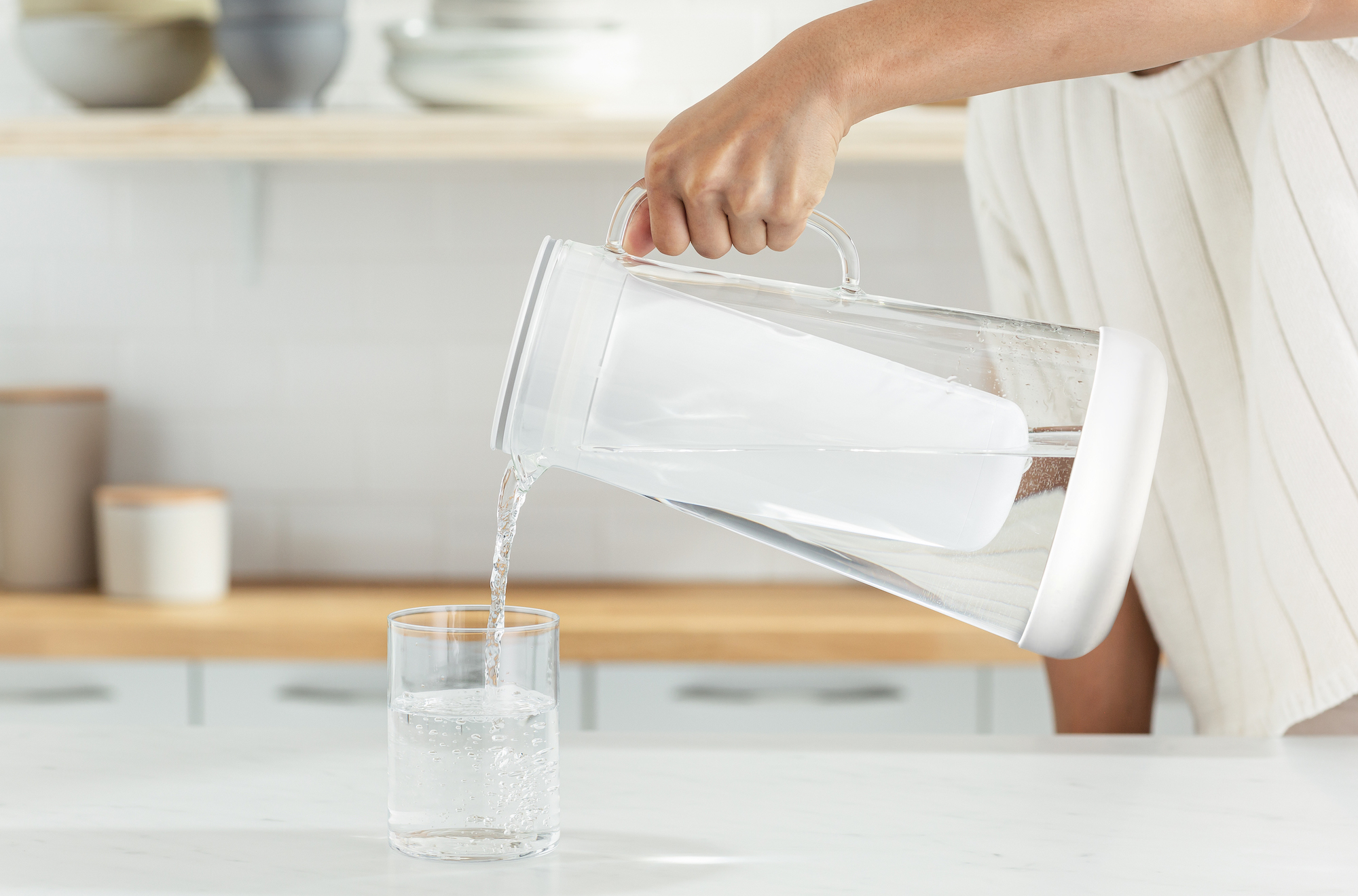People Consume a Credit Card’s Weight in Plastic Every Week – LifeStraw’s New Glass Water Pitcher Filters Microplastics Out
April 19, 2022

LifeStraw Home Filters Remove Microplastics, Along with Bacteria, Parasites, Lead, and PFAS
BALTIMORE, Md. – April 19, 2022 – LifeStraw, is pleased to announce the newly upgraded LifeStraw Home Glass Water Pitcher, the only water filter pitcher that removes bacteria and parasites plus lead, microplastics, PFAS (“forever chemicals”), and more than 30 contaminants. In addition to the industry leading water filtration, the new pitcher features stunning, Scandinavian design lines, hand blown, borosilicate glass, and a protective silicone base.
While most water filters do not remove microplastics, LifeStraw’s unique membrane microfiltration effectively removes the smallest of known microplastics from drinking water as shown in this comparison video. This is an important differentiator from the competition as 94% of U.S. tap water is contaminated with microplastics[1] and just last month microplastics were found to be present in human blood [2]. A study released by Professor Dick Vethaak, an ecotoxicologist at Vrije Universiteit Amsterdam in the Netherlands, found microplastic pollution in 80% of blood from human subjects.
While the impact on health is as yet unknown, researchers are concerned as microplastics cause damage to human cells. Additionally, a study conducted by the World Wildlife Fund revealed that from all the microplastics found in water, air, and other sources, humans consume more than 70,000 particles of microplastics every year. This is equivalent to consuming a credit card’s weight in plastic every week.[3]
LifeStraw Home Glass Pitcher Provides a Solution:
- Unique dual filtration technology includes a membrane microfilter of 0.2 micron pore size capable of removing microplastics plus bacteria and parasites. Secondary activated carbon and ion exchange filter also reduces lead, mercury, and chemicals including PFAS (“forever chemicals”), chlorine, herbicides, pesticides, dirt, sand, and cloudiness.
- Retains essential-for-health minerals like magnesium and potassium.
- Drastically improves taste
- Meets the highest EPA and NSF standards for filtration
- Independently lab tested by internationally recognized labs with all claims substantiated by publicly shared lab reports.
- A sustainable solution, avoiding the need to buy single use plastic bottled water which also contains and contributes to microplastics
- Backed by a certified Climate neutral B Corp that fights for the planet, and a give-back program that provides millions of children with safe water.
- Capacity: 7-cup
- $59.95
- Available at com
About LifeStraw
The original LifeStraw Personal Water Filter, which converts microbiologically contaminated water into safe, potable water, was introduced in 2005. LifeStraw’s Guinea worm filter has also been instrumental in the near-eradication of Guinea worm disease. Today, LifeStraw products are used in more than 64 countries by schools, clinics, outdoor enthusiasts, adventure travelers and households, and are regularly deployed to support communities impacted by emergencies or natural disasters requiring potable water. LifeStraw’s innovative water filtration technology is rigorously tested by independent laboratories and leveraged across some of the harshest environments around the world. The company is also Climate Neutral certified. For every product purchased, a school child in need receives safe water for a year. LifeStraw’s water filtration options are sold in retail stores in North America and Europe, and online at www.lifestraw.com. Follow LifeStraw on Instagram and TikTok at @LifeStraw.
____________________________________________________________________________
[1] MICROPLASTICS IN FISHERIES AND AQUACULTURE HTTP://WWW.FAO.ORG/3/A-I7677E.PDF
[2] THE GUARDIAN. MICROPLASTICS FOUND IN HUMAN BLOOD FOR FIRST TIME. HTTPS://WWW.THEGUARDIAN.COM/ENVIRONMENT/2022/MAR/24/MICROPLASTICS-FOUND-IN-HUMAN-BLOOD-FOR-FIRST-TIME
[3] WE KNOW PLASTIC IS HARMING MARINE LIFE. WHAT ABOUT US? HTTPS://WWW.NATIONALGEOGRAPHIC.COM/MAGAZINE/2018/06/PLASTIC-PLANET-HEALTH-POLLUTION-WASTE-MICROPLASTICS/






